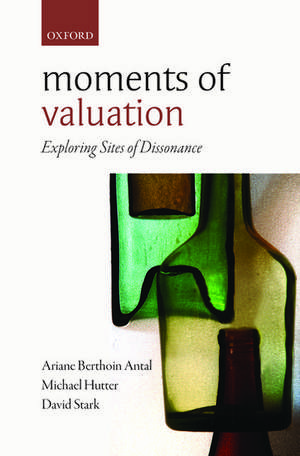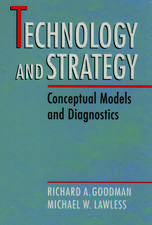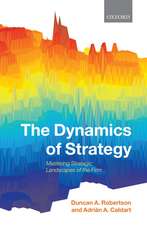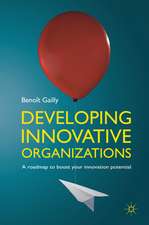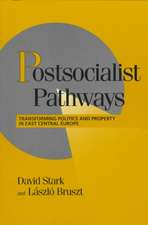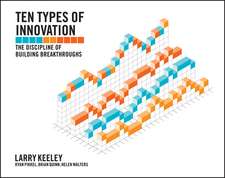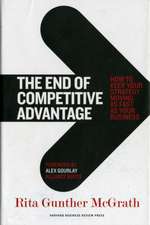Moments of Valuation: Exploring Sites of Dissonance
Editat de Ariane Berthoin Antal, Michael Hutter, David Starken Limba Engleză Hardback – 29 ian 2015
Preț: 659.67 lei
Preț vechi: 902.60 lei
-27% Nou
Puncte Express: 990
Preț estimativ în valută:
126.24€ • 131.31$ • 104.22£
126.24€ • 131.31$ • 104.22£
Carte tipărită la comandă
Livrare economică 03-09 aprilie
Preluare comenzi: 021 569.72.76
Specificații
ISBN-13: 9780198702504
ISBN-10: 0198702507
Pagini: 354
Dimensiuni: 163 x 240 x 25 mm
Greutate: 0.68 kg
Editura: OUP OXFORD
Colecția OUP Oxford
Locul publicării:Oxford, United Kingdom
ISBN-10: 0198702507
Pagini: 354
Dimensiuni: 163 x 240 x 25 mm
Greutate: 0.68 kg
Editura: OUP OXFORD
Colecția OUP Oxford
Locul publicării:Oxford, United Kingdom
Recenzii
Taken together, these chapters provide a broad and multi-level overview of valuations as an analytical lens. Reading through the chapters, I was tempted to reframe many current academic issues as problems of valuation; creativity and innovation, institutional work and contradictory logics, identity and role dynamics, sense making and storytelling approaches could all benefit from thinking in terms of valuation activities and devices. The centrality of materials, aesthetics and practices in performing valuation further suggests a theoretical synergy; indeed, valuation might provide an interesting hook for materiality scholars to hang their hat on. What are the stakes of such a choice, and what would be gained and lost in the process?
A remarkable feature of the book is the persistent coexistence of, on the one hand, the vast array of techniques described to establish aesthetic and material bases for valuation, and on the other hand, the centrality of the principle of dissonance, that newness comes not from the success of these techniques but from their perpetual incompleteness.
How do we value? There could hardly be more a fundamental social process. The recent, global resurgence of scholarly interest in valuation suggests that there is not. It has captured the attentions of researchers in fields ranging from accounting to science studies. The idea that value is somehow inherent in things has been taken apart, subverted by the contingencies of context, form, and cultures. But the question of innovation, of how new things, places, or expertise are deemed valuable, and how the value of old things is revised or re-appropriated has been relatively neglected. Until now. The editors and authors of Moments of Valuation have accomplished much by demonstrating crucial patterns in that which is provisional in valuation: valuing as situated in time, subjected to translation, testing, demonstration, and genre; sparked by dissonance. John Dewey, I think, would have approved.
This collection of brilliant essays suggests that a cacophony of work within cultural sociology can be understood more fully and simply within the frameworks of valuation of dissonance. Not only do these works give scholars important ideas to contend with, they suggest a path for more fruitful conversations about our social world.
Through its focus on moments of valuation, this edited collection radically broadens the range of sites in which the unfolding of value can be observed, from a Chinese art village to Danish pig farms, an AI newsgroup, Berlin restaurants and social housing design. Bringing together key international representatives from sociology, accounting, science and technology studies and organization studies, the book demonstrates that valuation does not necessarily signal the domination of one regime of worth economy, politics, aesthetics over others, but happens at the intersection of different registers. In so doing, Moments of Valuation returns to the all-too-familiar question of the new a much needed sense of puzzlement and surprise.
Moments of valuation are certainly critical moments. They determine the fate of whatever it is that is appraised. They also alter the traits of whatever it is that is appraising. The contributions gathered here rightly take these moments as the crucibles in which reality is brewed. These are the sites where an apt vocabulary for the appraisal of valuation shall be developed.
Moments of Valuation is an essential contribution to the rich literature on evaluation which is attracting a great deal of interest in North America and Europe alike. The editors have assembled a splendid cast of stars and younger researchers who each shed light on different micro-situation where evaluation unfolds. This important volume shows paths for future inquiries and thus makes a crucial contribution to our understanding of one of the most fundamental social processes.
A remarkable feature of the book is the persistent coexistence of, on the one hand, the vast array of techniques described to establish aesthetic and material bases for valuation, and on the other hand, the centrality of the principle of dissonance, that newness comes not from the success of these techniques but from their perpetual incompleteness.
How do we value? There could hardly be more a fundamental social process. The recent, global resurgence of scholarly interest in valuation suggests that there is not. It has captured the attentions of researchers in fields ranging from accounting to science studies. The idea that value is somehow inherent in things has been taken apart, subverted by the contingencies of context, form, and cultures. But the question of innovation, of how new things, places, or expertise are deemed valuable, and how the value of old things is revised or re-appropriated has been relatively neglected. Until now. The editors and authors of Moments of Valuation have accomplished much by demonstrating crucial patterns in that which is provisional in valuation: valuing as situated in time, subjected to translation, testing, demonstration, and genre; sparked by dissonance. John Dewey, I think, would have approved.
This collection of brilliant essays suggests that a cacophony of work within cultural sociology can be understood more fully and simply within the frameworks of valuation of dissonance. Not only do these works give scholars important ideas to contend with, they suggest a path for more fruitful conversations about our social world.
Through its focus on moments of valuation, this edited collection radically broadens the range of sites in which the unfolding of value can be observed, from a Chinese art village to Danish pig farms, an AI newsgroup, Berlin restaurants and social housing design. Bringing together key international representatives from sociology, accounting, science and technology studies and organization studies, the book demonstrates that valuation does not necessarily signal the domination of one regime of worth economy, politics, aesthetics over others, but happens at the intersection of different registers. In so doing, Moments of Valuation returns to the all-too-familiar question of the new a much needed sense of puzzlement and surprise.
Moments of valuation are certainly critical moments. They determine the fate of whatever it is that is appraised. They also alter the traits of whatever it is that is appraising. The contributions gathered here rightly take these moments as the crucibles in which reality is brewed. These are the sites where an apt vocabulary for the appraisal of valuation shall be developed.
Moments of Valuation is an essential contribution to the rich literature on evaluation which is attracting a great deal of interest in North America and Europe alike. The editors have assembled a splendid cast of stars and younger researchers who each shed light on different micro-situation where evaluation unfolds. This important volume shows paths for future inquiries and thus makes a crucial contribution to our understanding of one of the most fundamental social processes.
Notă biografică
Ariane Berthoin Antal is senior fellow at the WZB Berlin Social Science Center, where she currently leads the research stream on "Artistic Interventions in Organizations" in the Research Unit "Cultural Sources of Newness." She is Distinguished Research Professor at Audencia Nantes School of Management in France and honorary professor at the Technical University of Berlin. She earned her B.A from Pomona College, her M.A from Boston University and Dr. phil from the Technical University of Berlin. She has published widely in English, French and German on business and society, organizational learning and knowledge creation, and intercultural management, including the Oxford Handbook of Organizational Learning and Knowledge (with Meinolf Dierkes, John Child and Ikujiro Nonaka). She serves on the editorial board of numerous journals, including Organization Studies, Management Learning, and Gender and Management. Michael Hutter is research director at the WZB Berlin Social Science Center, where he heads the unit "Cultural Sources of Newness." He earned a B.A. in mathematics at Portland State University, an M.A. in economics at the University of Washington in Germany and a doctorate at the University of Munich. From 1987-2008, he held the chair for economic theory at Witten/Herdecke University, and from 2008-13 he was research professor for knowledge and innovation at the Institute of Sociology at Technische Universität Berlin. He was invited as a visiting scholar at the Rockefeller Foundation, Bellagio (2000), the School of Information Management Systems, UC Berkeley (2002), and the Getty Research Institute (2003 and 2007). His publications include Beyond Price. Value in Economics, Culture and the Arts (co-edited with David Throsby) and The Rise of the Joyful Economy (forthcoming).David Stark is Arthur Lehman Professor of Sociology and International Affairs at Columbia University where he directs the Center on Organizational Innovation. His book, The Sense of Dissonance: Accounts of Worth in Economic Life (Princeton University Press 2009) is an ethnographic account of how organizations and their members search for what is valuable. A recent essay on observation theory was published in Sociologica 2/2013, and articles in economic sociology appear in The American Journal of Sociology (2006 and 2010) and the American Sociological Review (2012) With photographer, Nancy Warner, he recently published This Place, These People: Life and Shadow on the Great Plains (Columbia University Press, 2013). Among other awards, Stark is the recipient of a Guggenheim Fellowship (2002) and an Honorary Doctorate from the École normale superieure de Cachan (2013).
